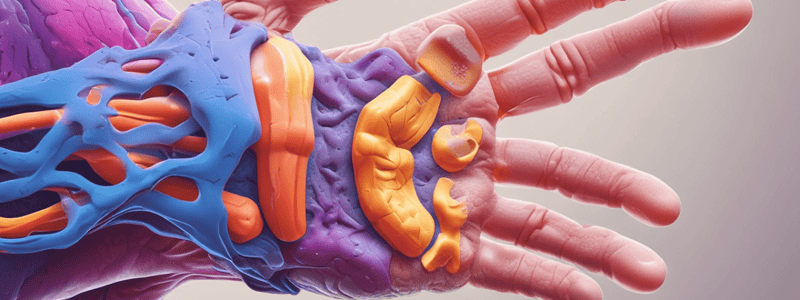Podcast
Questions and Answers
What is the primary cause of rheumatoid arthritis (RA)?
What is the primary cause of rheumatoid arthritis (RA)?
- Infections
- Environment only
- Genes only
- Genes and environmental factors (correct)
How does rheumatoid arthritis usually start in the body?
How does rheumatoid arthritis usually start in the body?
- By affecting the heart initially
- In large central joints
- By causing skin rashes
- In small peripheral joints (correct)
What is a characteristic feature of rheumatoid arthritis joint involvement?
What is a characteristic feature of rheumatoid arthritis joint involvement?
- Loss of muscle strength
- Anatomical variations due to synovial fibroblast programming (correct)
- Bone fusion
- Epigenetic changes in T-cells
Which antibodies are useful diagnostic tools for detecting rheumatoid arthritis?
Which antibodies are useful diagnostic tools for detecting rheumatoid arthritis?
What happens if rheumatoid arthritis is left untreated?
What happens if rheumatoid arthritis is left untreated?
What is the best approach for managing rheumatoid arthritis?
What is the best approach for managing rheumatoid arthritis?
How is joint destruction primarily caused in rheumatoid arthritis?
How is joint destruction primarily caused in rheumatoid arthritis?
What is the classification based on the duration of symptoms in RA?
What is the classification based on the duration of symptoms in RA?
Which factor contributes to anatomical variations in arthritis patterns in RA?
Which factor contributes to anatomical variations in arthritis patterns in RA?
Why is an interprofessional team recommended in managing RA?
Why is an interprofessional team recommended in managing RA?
Flashcards are hidden until you start studying
Study Notes
Rheumatoid arthritis (RA) is a chronic, inflammatory autoimmune disease characterized by inflammatory arthritis and extra-articular involvement. It affects many organs and is best managed with an interprofessional team to provide comprehensive care to the patients. Rheumatoid arthritis is known for its characteristic patterns of joint involvement, which are influenced by epigenetic programming of synovial fibroblasts, leading to anatomical variations in arthritis and its response to treatment.
Pathophysiology
RA is primarily caused by the interaction between genes and environmental factors, including tobacco and certain exposures. It usually starts in small peripheral joints and can progress to involve proximal joints if left untreated. Joint inflammation over time leads to joint destruction with loss of cartilage and bone erosions. RA is classified into early RA (symptoms < 6 months) and established RA (symptoms > 6 months). If untreated, RA is a progressive disease with significant morbidity and increased mortality.
Diagnostic Tests
Evaluating rheumatoid arthritis requires identifying the presence of inflammation, assessing imaging findings, and considering the complete clinical picture. Rheumatoid factor and anti-citrullinated protein antibodies (ACPA) are useful diagnostic tools in detecting rheumatoid arthritis's specific auto-antibodies. However, they are not sensitive enough to diagnose early rheumatoid arthritis and should be interpreted in conjunction with other clinical features.
Treatment Approach
Treatment strategies for RA aim to reduce joint inflammation, relieve pain, maximize joint function, and prevent joint destruction and deformation. The first line of treatment includes non-steroidal anti-inflammatory drugs (NSAIDs) and corticosteroids to control inflammation and relieve pain. Other medications include Disease-Modifying Anti-Rheumatic Drugs (DMARDs), targeted therapies, and biologic agents for advanced cases. Physical therapy and lifestyle modifications such as exercising, maintaining a healthy diet, and managing stress are essential components of comprehensive care.
Studying That Suits You
Use AI to generate personalized quizzes and flashcards to suit your learning preferences.




